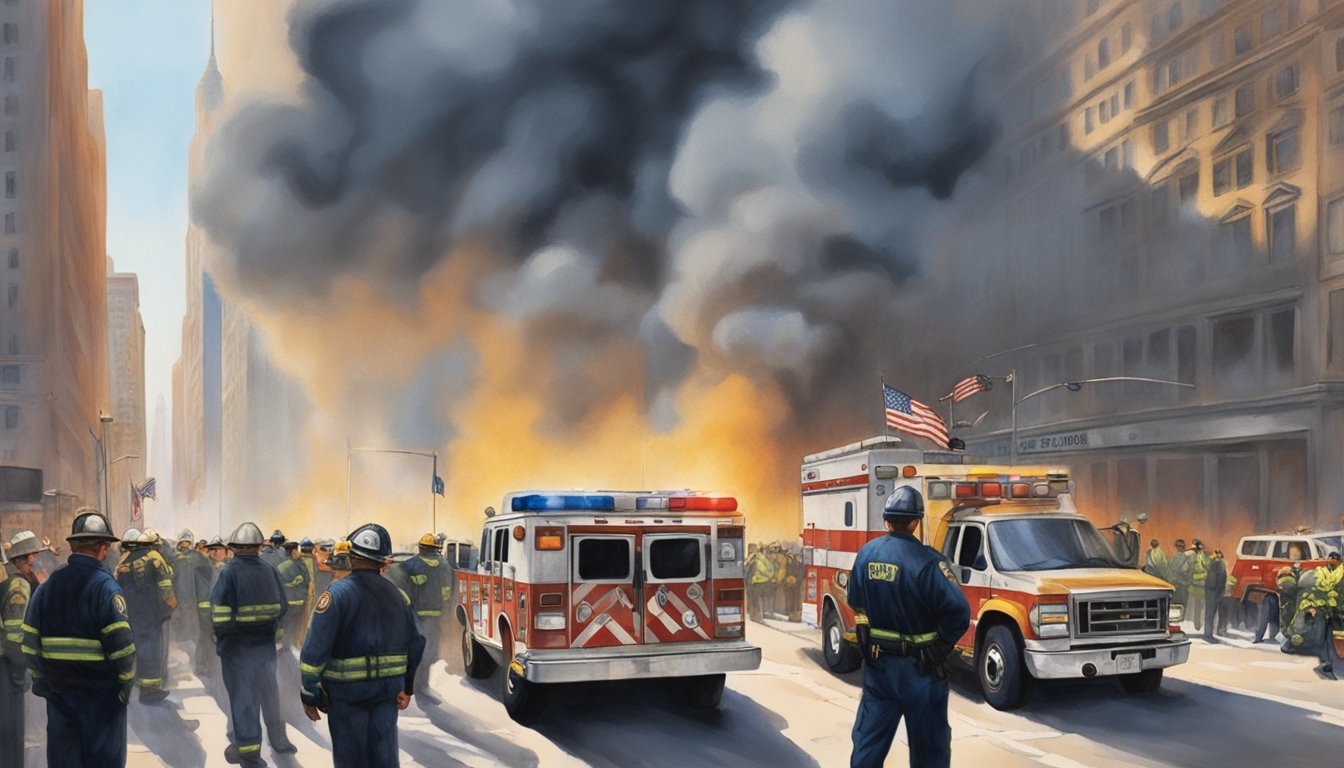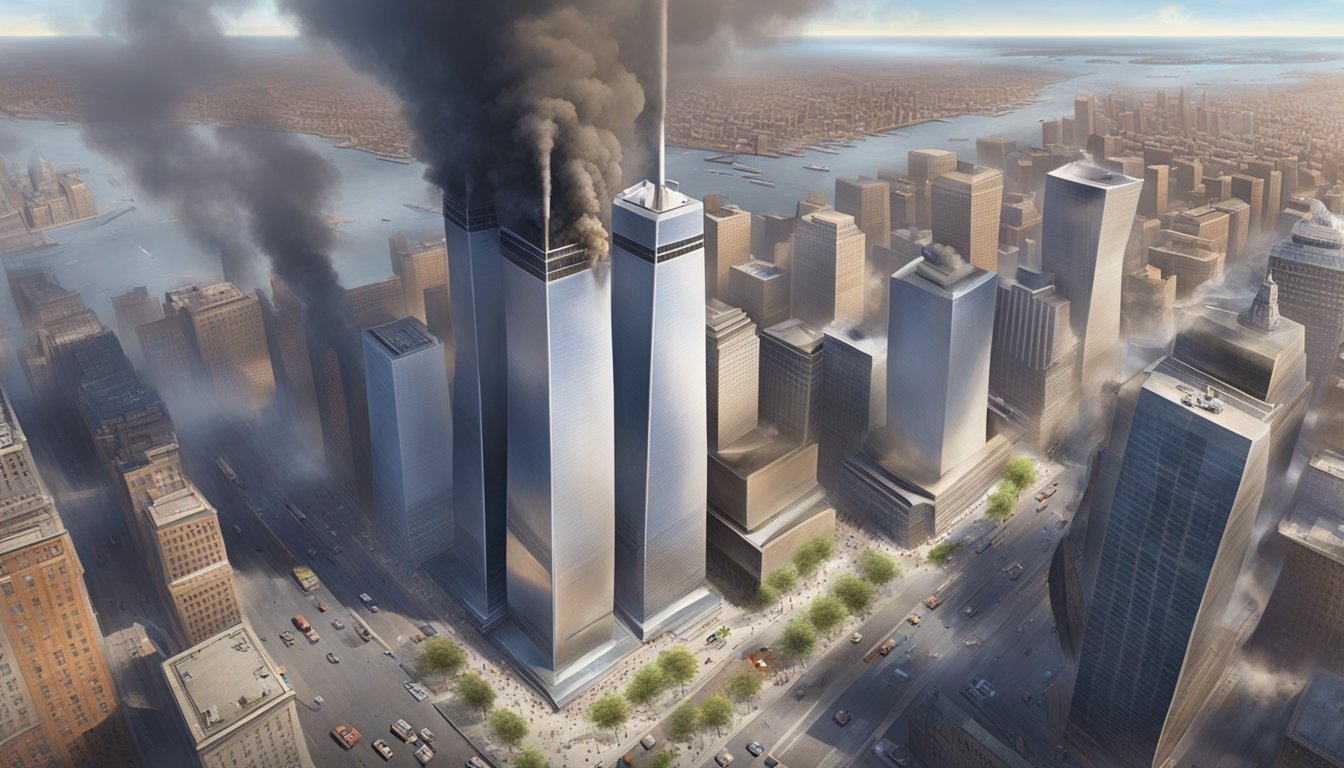Terror at the Twin Towers: 8 Documentaries on the '93 WTC Bombing
Revisiting the First Attack 30 Years Later
The 1993 World Trade Center bombing marked a pivotal moment in U.S. history, shaking the nation's sense of security and foreshadowing the tragic events of September 11, 2001. This terrorist attack on American soil left an indelible mark on New York City and the country as a whole, prompting increased awareness of global terrorism threats.
Several documentaries have explored the events surrounding the 1993 bombing, offering viewers in-depth analysis and firsthand accounts of this significant historical event. These films provide valuable insights into the planning, execution, and aftermath of the attack, as well as the investigative efforts that followed. By examining these documentaries, audiences can gain a deeper understanding of the impact and implications of this act of terror.
1) 'Terror in the Towers' by History Channel
'Terror in the Towers' is a documentary produced by the History Channel that examines the 1993 World Trade Center bombing. The film provides a detailed account of the events leading up to and following the attack.
Through interviews with survivors, first responders, and investigators, the documentary offers a comprehensive look at the impact of the bombing. It explores the planning and execution of the attack by terrorists.
The film also delves into the investigation that followed, showcasing the efforts of law enforcement to track down those responsible. It highlights the challenges faced by investigators in piecing together evidence from the blast site.
'Terror in the Towers' examines the broader implications of the attack on national security and counterterrorism efforts. It serves as a sobering reminder of the ongoing threat of terrorism.
https://www.imdb.com/title/tt0108546/
2) 'The 1993 World Trade Center Bombing: A Day That Changed America' by Reelz
This documentary explores the events of February 26, 1993, when terrorists detonated a bomb in the parking garage beneath the World Trade Center. It examines the attack's impact on American society and security measures.
The film features interviews with survivors, first responders, and investigators who were present that day. Their firsthand accounts provide a detailed look at the chaos and confusion following the explosion.
Experts analyze the motives behind the attack and the subsequent investigation that led to the capture of the perpetrators. The documentary highlights how this event marked a turning point in America's awareness of international terrorism.
'The 1993 World Trade Center Bombing: A Day That Changed America' also examines the long-term consequences of the attack. It discusses how security protocols at buildings across the country were revised in response to this threat.
The film emphasizes the resilience of New Yorkers and how the city recovered from this tragic event. It serves as a reminder of the ongoing vigilance required to prevent future attacks.
https://www.imdb.com/title/tt13893654/
3) 'World Trade Center: Anatomy of an Attack' by Discovery
This documentary provides a detailed examination of the 1993 World Trade Center bombing. It explores the planning and execution of the attack, as well as the subsequent investigation.
The film features interviews with key figures involved in the case, including law enforcement officials and eyewitnesses. It offers insights into the motivations of the perpetrators and the impact of the bombing on security measures.
'World Trade Center: Anatomy of an Attack' uses archival footage and reenactments to recreate the events of February 26, 1993. It also delves into the forensic analysis that helped identify the bombers.
The documentary highlights the significance of this attack as a precursor to later terrorist activities. It examines how the bombing influenced future security protocols at high-profile locations.
Viewers gain a comprehensive understanding of this pivotal event in the history of terrorism on American soil. The film serves as an important resource for those interested in national security and counterterrorism efforts.
4) 'Ingenious Minds: Ramzi Yousef' by Discovery Channel
This documentary explores the life and crimes of Ramzi Yousef, the mastermind behind the 1993 World Trade Center bombing. The film delves into Yousef's background, motivations, and the planning of the attack.
Viewers gain insight into Yousef's technical expertise and the intricate details of the bomb plot. The documentary examines how he managed to evade capture for two years following the bombing.
'Ingenious Minds' also covers Yousef's other terrorist activities, including his involvement in the Bojinka plot. This ambitious plan aimed to blow up multiple airliners over the Pacific Ocean.
The film features interviews with law enforcement officials and terrorism experts. These interviews provide valuable context about Yousef's impact on global terrorism and security measures.
Discovery Channel's documentary offers a comprehensive look at one of the most notorious terrorists of the 1990s. It sheds light on the events that foreshadowed the larger attack on September 11, 2001.
https://www.imdb.com/title/tt2351894/
5) 'American Experience: The Bombing of Wall Street' by PBS
'American Experience: The Bombing of Wall Street' examines a lesser-known terrorist attack in American history. The documentary explores the 1920 bombing on Wall Street that killed 38 people and injured hundreds more.
The film delves into the social and political context of the time, including labor unrest and anti-capitalist sentiment. It details the aftermath of the bombing and the ensuing investigation led by Attorney General A. Mitchell Palmer.
Featuring interviews with historians and archival footage, the documentary provides insight into this often overlooked event. The film connects the 1920 bombing to broader themes of domestic terrorism and political extremism in American history.
'The Bombing of Wall Street' aired on PBS as part of the long-running American Experience series. It offers viewers a detailed look at a pivotal moment in early 20th century America.
https://www.pbs.org/wgbh/americanexperience/films/bombing-wall-street/
6) 'Terror Strikes the Heart of America: The 1993 WTC Bombing' by Biography
'Terror Strikes the Heart of America: The 1993 WTC Bombing' is a documentary that examines the first terrorist attack on the World Trade Center. The film provides a detailed account of the events that unfolded on February 26, 1993.
It explores the planning and execution of the bombing, which involved a truck bomb detonating in the parking garage beneath the North Tower. The documentary highlights the impact of the explosion, which killed six people and injured over 1,000.
The film delves into the investigation that followed, showcasing the efforts of law enforcement to identify and apprehend the perpetrators. It also discusses the broader implications of the attack on national security and public perception.
Through interviews with survivors, first responders, and experts, the documentary offers personal perspectives on the tragedy. It places the 1993 bombing in the context of evolving terrorist threats against the United States.
The film serves as a sobering reminder of the vulnerability of iconic landmarks and the ongoing challenges in combating terrorism.
[https://www.biography.com/news/world-trade-center-bombing-1993]
7) 'NY Times Retro Report: 1993 WTC Bombing' by The New York Times
The New York Times produced a concise yet informative documentary about the 1993 World Trade Center bombing as part of their Retro Report series. This short film examines the attack and its aftermath, providing historical context and analysis.
The documentary features archival footage from the day of the bombing, showing the chaos and confusion that ensued. It includes interviews with key figures involved in the investigation and response to the attack.
Experts discuss the significance of this event as one of the earliest acts of international terrorism on American soil. The film explores how the bombing served as a precursor to the 9/11 attacks and influenced subsequent counterterrorism efforts.
The Retro Report also delves into the investigation that led to the capture and conviction of the perpetrators. It highlights the forensic techniques used to piece together evidence from the bomb fragments.
This documentary offers valuable insights into a pivotal moment in U.S. history, demonstrating how the 1993 bombing changed perceptions of terrorism and security in America.
https://www.nytimes.com/video/us/100000002747880/1993-world-trade-center-bombing.html
8) 'CNN Documentaries: Remembering the 1993 WTC Attack' by CNN
CNN produced a documentary commemorating the 10th anniversary of the 1993 World Trade Center bombing. The film aired on February 26, 2003, exactly a decade after the attack.
The documentary revisits the events of that fateful day, exploring how a truck bomb detonated in the parking garage beneath the North Tower. It examines the immediate aftermath and the investigation that followed.
Interviews with survivors, first responders, and investigators provide personal accounts of the tragedy. The film also highlights the often-overlooked victims' families, who didn't receive the same level of public support as those affected by 9/11.
CNN's documentary draws connections between the 1993 bombing and the 2001 attacks. It suggests the earlier incident served as a precursor to the larger-scale terrorist plot that would unfold eight years later.
The film offers a somber reflection on a significant but sometimes overshadowed moment in New York City's history. It serves as a reminder of the resilience of those affected and the ongoing threat of terrorism.
Context of the 1993 WTC Bombing
The 1993 World Trade Center bombing marked a pivotal moment in U.S. history, exposing vulnerabilities in domestic security and foreshadowing future terrorist threats. This attack laid the groundwork for significant changes in counterterrorism efforts and building security protocols.
Historical Background
On February 26, 1993, a van bomb detonated in the basement parking garage of the World Trade Center's North Tower. The explosion created a massive crater and sent smoke throughout the complex. Six people lost their lives, and over 1,000 were injured in the attack.
The bombing was carried out by Al-Qaeda operatives, led by Ramzi Yousef. Their goal was to topple the North Tower onto the South Tower, potentially killing thousands. While this plan failed, the attack caused extensive damage and widespread panic.
Initial Security Concerns
Prior to the 1993 bombing, security measures at the World Trade Center were relatively lax. Public access to the buildings was largely unrestricted, and the parking garage beneath the towers was open to all vehicles.
The attack exposed critical weaknesses in building security and emergency response protocols. It prompted immediate changes, including enhanced access controls, increased security personnel, and improved evacuation procedures.
These initial security upgrades were significant, but still fell short of preventing the devastating attacks that would occur on September 11, 2001. The 1993 bombing served as a deadly precursor, highlighting the need for continued vigilance and evolving security strategies.
Impact and Aftermath
The 1993 World Trade Center bombing caused significant physical damage and led to major changes in security protocols. The attack exposed vulnerabilities in building safety and prompted a reevaluation of counterterrorism measures.
Structural Damage and Repairs
The explosion created a 100-foot-wide crater several stories deep in the North Tower's basement. It damaged structural supports, severed electrical power lines, and disabled emergency systems. The blast destroyed the main command center for building operations.
Repairs took several months and cost over $500 million. Workers removed over 2,000 tons of debris and installed new steel supports. The renovation included upgraded fire safety systems and improved emergency lighting.
Despite the extensive damage, the towers reopened within a month. Full repairs were completed by the end of 1993.
Changes in Security Policies
The bombing led to sweeping security enhancements at the World Trade Center and other high-profile buildings. Vehicle access to the underground parking garage was restricted. Security checkpoints were established at building entrances.
The Port Authority increased its police presence and installed new surveillance cameras. Tenant companies implemented stricter visitor policies and employee screening procedures.
On a national level, the attack spurred greater focus on domestic terrorism threats. It led to increased funding for counterterrorism efforts and improved coordination between law enforcement agencies.





